Respond to kindness with kindness. Respond to evil with justice.
-- Attributed to Confucius
"The Brass Rule"One law for the Lion and Ox is oppression.
-- William Blake

Help yourself to my Planescape Character Generator for MS-DOS.
In the AD&D universe, Arcadia is the imaginary world where the dreams of moralists and social planners have come true. Here Law predominates and there is a tendency to Good.
As usual, Gary Gygax's original conception was superb. Arcadia -- actually located in the heroic society of ancient Greece -- was adopted by Renaissance poets as an imaginary land of pastoral tranquility and righteous law.
Even if we do not all profess Arcadian alignment, we must respect
TSR's copyrights. It's only good laws like these that enable
us all to live together, enjoying the productions of each other's
hard work.
Arcadians -- the living and the dead -- work together for the common good, and
this seems completely natural to them. They believe in promoting the public good
through strict law, and are utterly intolerant of those who do not
share their views. They like to talk about "peace through strength"
and "building and maintaining community." They will let you know
exactly what they think, and will welcome you if you think like they do.
Many of them can cast "Know Alignment" at will.
Armies of soldiers who died for good
causes are here. Decent folk will be invited to ride with these
armies.
Creatures who live on these planes might war with
one another for ideological reasons.
On Arcadia, a paladin's warhorse is able to speak.
Lawful-good types are safe on Arcadia. Neutral-good types are
tolerated as long as they obey the laws, and chaotic-good types
are asked to finish their business and leave.
Lawful evil creatures are assumed to be enemy invaders, and
all evil creatures are attacked at
once, with no questions asked.
Non-good, non-lawful
types are escorted to the nearest gates.
Actually, non-lawful-good types
should think seriously about staying away from Arcadia
altogether.
No matter what your alignment, your player characters
will certainly get lectured by at least a few Arcadians.
They are likely to point to ways in which your group
has worked together and accomplished good things -- and if the
group plays well together, the Arcadians may welcome them
as potential converts.
Certain Arcadians (particularly the Harmonium) will talk with anyone
about their beliefs and actions, and point out visitors' own decent
tendencies, and the obvious advantages of people working together.
This will make for good role-playing opportunities, as Arcadians
try to persuade the party that they belong here. And perhaps they do --
or can aspire to even greater goodness.
Arcadia
is a common location
of the headquarters of decent sects devoted to athletics, city
life, commerce, public safety and guardianship, physical
strength, or war. Most sects that are preoccupied with forcing
virtue on their neighbors have their headquarters here.
Here also are the spiritual homes of decent legalists
who were primarily concerned with keeping their own minority
groups intact, safe, happy, and well-behaved. (Sects focused
on minority identity alone are usually based on
Mechanus or the Outlands. Those that emphasize old minority-group
hatreds usually align with Acheron or Baator despite all their
protestations of moral high ground.)
One of the physicians with whom I trained in residency
was disowned by his parents because he refused to join
the American Communist Party.
Public portals between the regions and to
remote planes resemble vehicles for long journeys. Clear sky-blue
pools reaching into the astral appear wherever normal pools of water would be
appropriate, and can be maneuvered if they connect with a river
or ocean. Portals to the Outlands, the Holy Mountain or Mechanus are often
arches within steel trellises.
The classic Egyptian civilization is represented by "Heliopolis".
Divided among the Egyptian "gods", it mirrors an
early community where people discovered good laws that led to peace
and progress.
The heroic society of ancient Babylonia has its ideal form here.
We know this society from Hammurabi's legal code, and in Babylonian territory,
justice is harsh. No dragons are allowed in Babylonian territory,
and all their special abilities fail. The culture in Babylonian territory
is bronze-age, and what's available is limited accordingly.
Classical Japan, famous for its strict feudal code, is represented
on Arcadia by the world of the ki-rin, rainbow-colored flying
unicorns of great magical power and goodness.
Mount Clangeddin is the realm
of the dwarven armies. They expect the realm to remain as
perfect as they perceive themselves to be. Within the mountain
is a huge realm of tunnels, including nine cities. The military
brass turns a blind eye to the misdeeds of soldiers, so long as
they are kept hidden. The dwarves believe that if they die while
fighting outside the realm, they will be annihilated, yet they do
this in the name of bravery. Mandible is a city of humanoid
ants, the formians.
Azuth is a realm of wizards. Its cave-entrance is hidden
by an illusion that only a wizard can penetrate. It leads to a
staircase suspended in apparently infinite space glowing with
shadowy light. At the bottom is the city of Mage's Rest, lit by
glowing, bobbing orbs, full of ritual and mystery. Here, any
wizard of any alignment can claim citizenship. Anyone casting a
spell to harm another receives an immediate backlash in kind.
Spell alterations in
Arcadia: All spells take twice as long to cast.
Many spells fail unless they're done for the greatest real benefit
of the greatest number. Conjuration-summonings done for a socially responsible
purpose have the best possible result, while those for a bad
purpose result in the summoned creature being uncontrolled.
Divinations only work for groups of four or more folks seeking
the greatest good for the greatest number of decent creatures.
Enchantments and charms always allow a save, and at +4 if one is
normally allowed. The locals always recognize an illusion, and
everyone else checks vs. intelligence at +4 to see through it.
Necromancy only works for the common good. Animated dead turn on
the caster, and death magic turns back on the caster. Wild mages
lose two levels, and no surge is possible. Elemental magic works
at double effect for those aligned like the plane, fails for
evils and chaotics, and works normally for everyone else. It seems
unlikely that spell keys would be able to overcome any of these
problems.
Wizardly spell keys are
material from the plane, bounded by a
geometric shape, and symbolic of the desired effect. Power keys
are appropriate to the sect, and last for only a week.
Third edition "Manual of the Planes" focuses primarily on simplifying
and encouraging individual campaign creativity. Ideas include:
I respectfully suggest that Arcadia be regarded as good-tending
and thoroughly lawful. These effects are additive
The Fourth Edition has retained something of Arcadia in "Hestavar, the bright city."
Those who pass through the gold and silver clouds that surround it will find
the most prosperous city anywhere. Arcadia's sun still shines overhead, but now it
is always noontime. The theme is "the benefits of civilization."
This is home to Erathis (who is "unaligned" --
the Lawful Neutral alignment of civilization without kindness or cruelty
was removed from the fourth edition because it is hard to play meaningfully.)
It is also home to Pelor, patron of sunshine and kindness (formerly "neutral good")
and the new patron of learning, Ioun. I'm happy that the best library in the cosmos
is now in a nicer place.
The kindness, courage, goodness, and religious intolerance of Arcadia
survives as Eberron's "Silver Flame" ministry.
Perhaps visitors would get bonuses or penalties
to intelligence, wisdom, and charisma-based skill checks
depending on how much their behavior has been in keeping with the ideals
of the locals.
In keeping with the flexibility of the third and fourth editions and the
backgrounds of many players, perhaps Arcadia is essentially a world
where like-minded spirits meet. It looks and works like our world,
except that the Utopian schemes actually work instead of
just making things worse.
NPC attitudes are typically "friendly" so long as visitors show themselves
to be decent and law-abiding.
If there is a spiritual race native to Arcadia, it is devoted to promoting the community's
ideals
among the living by encouragement and subtlety, rather than by force.
The dead find communities matching their own ideals and interests,
and continue to live much as they did on earth, though no longer able to visit the
Prime Plane. Instead of the "gods" of polytheism, each living lawful, good-tending divine spellcaster is
sponsored (and monitored)
by a prayer fellowship with similar interests based on Arcadia.
For the fourth edition, I suggest no penalties for divine spellcasters from elsewhere. For earlier editions, I respectfully suggest that the only penalty for such a cleric
on a differently-aligned outer plane is the loss of one spell
of the highest available level for each plane removed, with the Outlands two planes from Mechanus, Elysium, Limbo, and the Gray Waste. When one level
is depleted, spells of the next highest level are lost. Thus a cleric
sponsored from Arcadia would lose one spell on Mt. Celestia or Mechanus,
six spells on Carceri or Pandemonium, and seven spells on the Abyss. Moving to the Outlands loses three spells.
A world where utopian fantasies do not lead to disaster
would be as different from our own world
as any rules-intensive world ever visited by adventurers.
Referees might not want players to realize that they have
entered Arcadia. Depending on the site of arrival,
visitors might simply recognize the perfect realization of one of our world's
dreams of an ideal state. The local clergy are good and happy
people, and they will be prove to be effective
leaders and proselytizers.
Because this is a lawful plane, there may be some very large civilizations.
 As it's been developed in the "Planescape" milieu, Arcadia is a generally
happy place where everything orders itself for the common good.
It is full of well-tended (or even self-maintaining) formal gardens,
fields and orchards, geometric cities, and uneroded mountains. Day
and night are of equal length, and there is no dawn or twilight.
Even the seasons are of equal length, and change abruptly.
The weather is moderate, and never inconvenient. There are well-laid-out
roads that lawfuls traverse much faster than chaotics. The normal
animals are robust and well-behaved, and none are wild. Social animals (dutiful
dogs, benevolent bees, etc.) are especially common. Crops grow in perfect
order without weeds, and farm animals line up willingly to be
slaughtered for the common good. Every fruit and flower is perfect. Primitives
will find realms of gentle mists, fertile plains, and friendly animals.
As it's been developed in the "Planescape" milieu, Arcadia is a generally
happy place where everything orders itself for the common good.
It is full of well-tended (or even self-maintaining) formal gardens,
fields and orchards, geometric cities, and uneroded mountains. Day
and night are of equal length, and there is no dawn or twilight.
Even the seasons are of equal length, and change abruptly.
The weather is moderate, and never inconvenient. There are well-laid-out
roads that lawfuls traverse much faster than chaotics. The normal
animals are robust and well-behaved, and none are wild. Social animals (dutiful
dogs, benevolent bees, etc.) are especially common. Crops grow in perfect
order without weeds, and farm animals line up willingly to be
slaughtered for the common good. Every fruit and flower is perfect. Primitives
will find realms of gentle mists, fertile plains, and friendly animals.How do you role-play a not-altogether-good cleric?
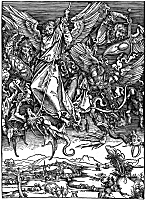 The "Harmonium" philosophic sect,
which fights evil and is not noted for tolerance, has its
headquarters here, in the city of Melodia. ("There are two ways
of doing anything: Our way, and the wrong way.") The Harmonium's
idea of fun is to listen to edifying speeches and sing hymns.
Tourists are not wanted here. There is a chaotic-good
team of adventurers forming an
underground with alignments masked. The Harmonium has set of
"training camps" to rehabilitate non-lawful good creatures.
Anyone in the camps must check vs. wisdom at -4 to disobey any
request of the guards; otherwise, it will seem right and
reasonable to obey. Eventually, most folks come to like the
camps.
The "Harmonium" philosophic sect,
which fights evil and is not noted for tolerance, has its
headquarters here, in the city of Melodia. ("There are two ways
of doing anything: Our way, and the wrong way.") The Harmonium's
idea of fun is to listen to edifying speeches and sing hymns.
Tourists are not wanted here. There is a chaotic-good
team of adventurers forming an
underground with alignments masked. The Harmonium has set of
"training camps" to rehabilitate non-lawful good creatures.
Anyone in the camps must check vs. wisdom at -4 to disobey any
request of the guards; otherwise, it will seem right and
reasonable to obey. Eventually, most folks come to like the
camps. 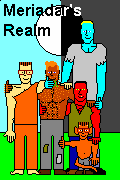 Meriadar's sect headquarters
is a secret,
city hidden between mountains and inside a deep forest.
It is a haven for humanoids trying to be good. Here strict
laws control the innate tendencies to cruelty.
Meriadar's sect headquarters
is a secret,
city hidden between mountains and inside a deep forest.
It is a haven for humanoids trying to be good. Here strict
laws control the innate tendencies to cruelty.
-1 on all charisma checks for all evil creatures
-1 on all intelligence, wisdom, and charisma checks for all non-lawful, non-chaotic creatures
-2 on all intelligence, wisdom, and charisma checks for all chaotic creatures
Good-based spells (non-chaotic) work as if caster were 2 levels higher.
Evil-based spells (non-chaotic) require a Spellcraft check (DC 15) for success.
Law-based spells work as if caster were 4 levels higher.
Chaos-based spells simply fail.
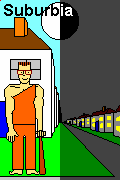 Arcadia invites development by the referee, as realms
where people obey an internal code that maximizes the happiness
of their communities. For example, there must be:
Arcadia invites development by the referee, as realms
where people obey an internal code that maximizes the happiness
of their communities. For example, there must be:
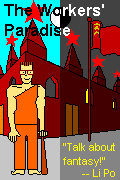 In our world, there are many different visions of justice and righteousness.
Many activists and social engineers (both "liberal" and "conservative")
are charlatans and hypocrites. Many more are simply stupid or
horribly misguided.
In our world, there are many different visions of justice and righteousness.
Many activists and social engineers (both "liberal" and "conservative")
are charlatans and hypocrites. Many more are simply stupid or
horribly misguided.
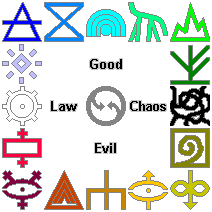




![[Do Justice, Love Mercy, Walk Humbly]](holywar.gif)


